Office of Research & Development |
 |
Office of Research & Development |
 |

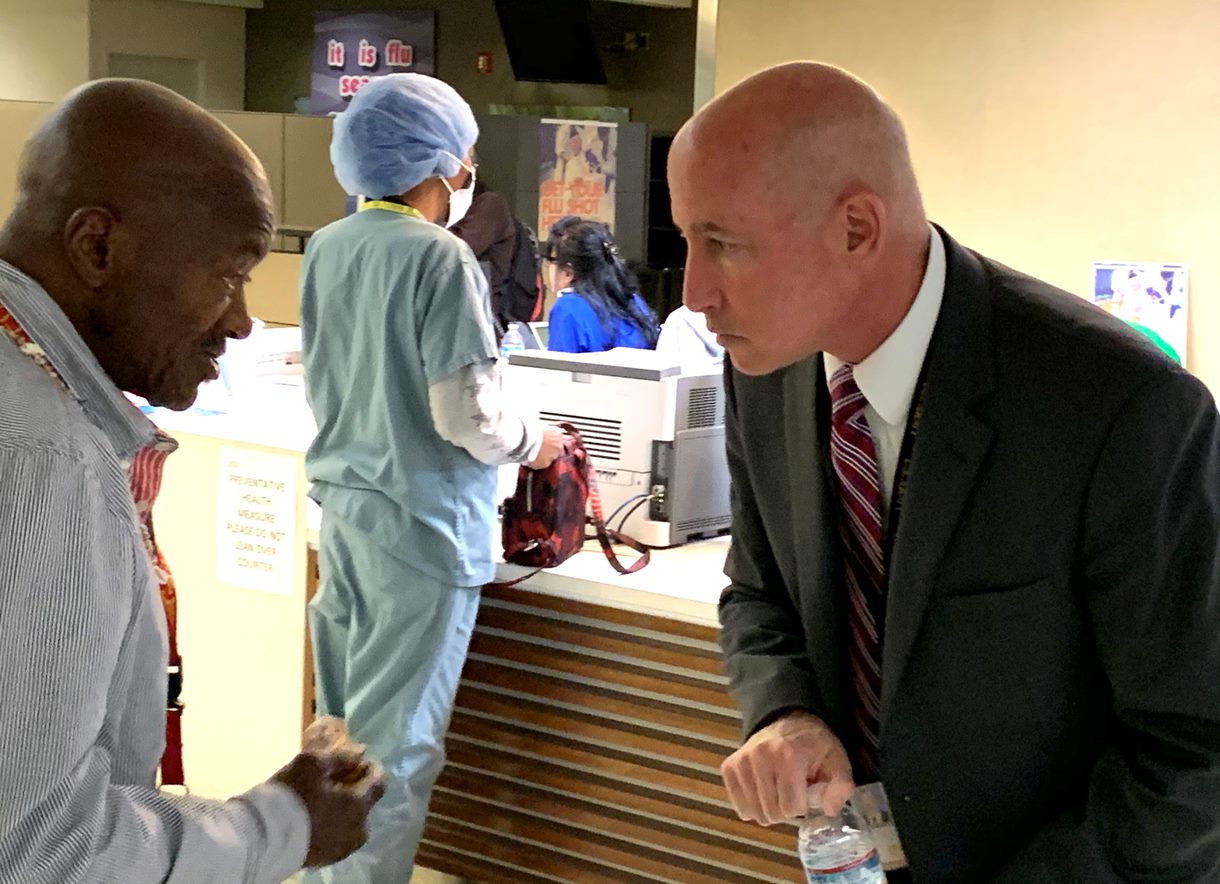
Dr. Steve Braverman (right), director of the VA Greater Los Angeles Healthcare System, speaks with Marine Veteran Jerry Harris about his health care needs. (Photo by Steve Ruh)
December 10, 2020
By Mike Richman
VA Research Communications
"It's really important to try to drive gains in research that are connected with the kinds of clinical care that we're providing, so there's a link between the innovation and outcome that we're trying to achieve."
In 2013, Dr. Steve Braverman, a physical medicine and rehabilitation physician in the U.S. Army Medical Corps, was named commander of the Walter Reed Army Institute of Research. The institute works to solve the top threats to soldier readiness and lethality, such as disease and battle injury.
Not long after, an outbreak of the Ebola virus in West Africa spread to urban areas and across borders, soon becoming an epidemic. The virus, which spreads by human-to-human transmission, can cause fever, body aches, diarrhea, and occasional bleeding inside and outside the body, among other adverse effects. It is often fatal if left untreated.
Sensing the urgency, Braverman and his staff shifted the focus of their clinical research program to pursue studies on an Ebola vaccine.
“With that, we actually were the first health care site in the U.S. to do a Phase 1 Ebola vaccine trial in humans,” he says. The U.S. Food and Drug Administration approved that vaccine in 2019 after clinical trials in Guinea, a West African country. “We also had research studies on tropical diseases like malaria and dengue fever, a big program for HIV across the world, and another centered on military psychiatry and traumatic brain injury,” he adds.
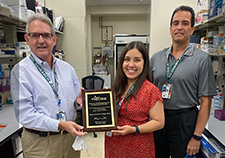
VA center training the next generation of researchers in blood clots and inflammation

AI to Maximize Treatment for Veterans with Head and Neck Cancer
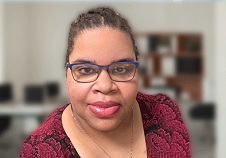
VA researcher works to improve antibiotic prescribing for Veterans
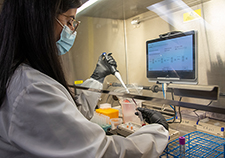
VA’s Million Veteran Program played crucial role in nation’s response to COVID-19 pandemic
Understanding how to respond to the Ebola virus has come in handy for Braverman, who is now the director of the VA Greater Los Angeles Healthcare System. He has applied lessons learned from Ebola to his decision-making during the COVID-19 pandemic.
“From the standpoint of Ebola, the part that was important as a lesson learned was to be flexible with your current processes and systems and adapt them to what’s required based on national interest or the situation at hand,” he says. “So while we had programs ready to use our research facilities, when it became a high national priority to work on Ebola, we shifted resources to put an effort toward the Ebola vaccine, resources and capability that we already had.”
Similarly with COVID-19, Braverman and his colleagues changed their inpatient priorities.
“We moved facilities around so we could build surge beds and increase our capacity for infection isolation rooms,” he says. “We also opened a new first in VA, a COVID-19 recovery unit for nursing home patients who were COVID-19 positive but didn’t need hospitalization, to segregate them from the general nursing home population.
“With our homeless population, we essentially used the resources that we have but reconfigured them to meet the needs of the current requirements,” he adds. “We’ve been transparent in what we’re doing so everybody on the staff understands the new goals and the new priorities, while at the same time understanding that everything you try isn’t going to work right the first time you try it. As a learning and process improvement organization, we would eventually get it right, even if it wasn’t perfect the first time out.”
Braverman’s role as commander of the Walter Reed Army Institute of Research from 2013 to 2015 and a follow-on assignment at the Army surgeon general’s office marked the end of his three-decade career in the Army Medical Corps. He spent the next three years as director of the Edward Hines, Jr. VA Hospital in Illinois and became director of VA Greater Los Angeles (GLA) in September 2019.
The coronavirus pandemic took hold a few months later, with GLA participating in several COVID-19 trials under Braverman’s leadership. They have included studies on the antiviral drug remdesivir (trade name Veklury) and the prostate cancer drug degarelix (trade name Firmagon), as well as a vaccine made by the U.S.-based pharmaceutical company Moderna.
Because of the urgency in finding a vaccine for COVID-19, the study approval process had to be compressed in order to meet Moderna’s deadline to start volunteer recruitment. About two weeks before that deadline, Braverman received a message from VA’s Office of Research and Development (ORD) that GLA was in jeopardy of not meeting the deadline. To do so, the facility had to squeeze a process that usually takes months into those remaining weeks.
Braverman and his team accelerated their efforts to meet the deadline. He started by meeting with everyone involved in the project to identify what was imperative to achieve approval. “We set timelines for tasks,” he says. “I authorized ad hoc research review meetings and required daily progress reports. If a task fell behind, we analyzed why and revised it as necessary.”
He reported the progress to ORD to remain transparent and instill confidence that GLA would complete the approval process before the deadline, he says.
VA Greater Los Angeles was the only VA site to participate in the double-blind Moderna trial, which is now closed to enrollment. Those who volunteered at GLA included none other than Steve Braverman. He received two shots—the vaccine or placebo and a booster four weeks later—but to this day remains blinded as to which one he was given. Last month, Moderna announced based on interim results that its vaccine candidate was 94.5% effective within two weeks after receiving a second dose.
“I thought it was important to support the research that we’re doing, in this case by being a subject in the Moderna trial,” Braverman says. “I also thought it was important to be part of the team that was helping to determine whether the vaccine was safe and effective. Being a part of the trial gives me more insight as to what it takes to have good strong programs for health care and research in the facility that I lead.”
While being able to see what other participants were experiencing in the trial, he also learned “what it will take once we start to roll out the COVID-19 vaccine. I expect there to be some resistance to getting the vaccine among our Veterans and staff. By sharing my own experience and our facility’s success in safely providing a vaccine to our study subjects, we might convince more people to get vaccinated.”
The COVID-19 era has presented challenges for Braverman, including the need to conduct meetings virtually instead of face-to-face with groups. “It’s a little bit harder to understand the needs of everyone in a virtual environment from a leadership perspective,” he explains.
Another top challenge, he says, relates to the economic, social, and security issues that surfaced following the death of George Floyd in May—amid the pandemic restrictions in the community—and understanding how that whole dynamic has affected his staff. “We have to make sure the staff has the knowledge of what we need to do, why we need to do it, how we’re going to change, how we would succeed, and what success looks like,” Braverman says. “Communication became very important, especially because we couldn’t just all gather and have a meeting and have in-person discussions.”
During his three-decade career in the Army, Braverman took on leadership roles that helped prepare him for the responsibility he holds today.
He joined the Army in 1983 as a reservist with an Army health professions scholarship that enabled him to pay his bills at Vanderbilt University medical school in Tennessee. He began active duty after medical school and eventually became an academic physician at Walter Reed. As the residency director and service chief at the hospital, he stayed past his obligation because he was doing a job he enjoyed very much. He remembers having a mentoring conversation in 1999 with the commander of Walter Reed, Brigadier General Dr. Michael Kussman, who went on to become VA’s Under Secretary for Health in 2007.
“He gave me some good advice, saying don’t look back on a 20-year Army career and wish you would have done something, because you can,” Braverman recalls. “He meant that you could try other things in the Army, like other leader operational positions, and that if it wasn’t to my liking, then I could always go back to academic medicine by taking care of the soldiers and their families at a place like Walter Reed. After thinking about that, I embarked on an operational- type tour on which I next went to be a hospital deputy commander. I deployed to Iraq, and I worked in the surgeon general’s office and the National Defense University. I got to see pretty much everything in the way our country is supported by the Army and was able to directly and indirectly through leadership care about our soldiers and meet the needs of our nation.
“That element of service became very important to me,” he adds, “so I stayed well beyond my four-year obligation time because I kept getting good jobs that enabled me to serve, take care of soldiers, and lead teams to make a difference, period. I liked leading departments, so I could have an impact on many people.”
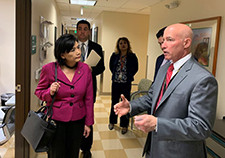
Steve Braverman meets with California Congresswoman Judy Chu during a tour of a satellite health care clinic run by VA Greater Los Angeles. (Photo by Steve Ruh)
At the same time, Braverman became acclimated to a rich research environment. He served as hospital commander at Fort Knox in Kentucky and Fort Hood in Texas. The health care and research operations at those bases were under his purview. He later went to Iraq as the chief of clinical operations for Multi-National Corps – Iraq, the tactical unit responsible for command and control of operations in Iraq. He oversaw all medical research done by the U.S. military in that country.
In 2013, Braverman became commander of the Walter Reed Army Institute of Research (WRAIR), the largest biomedical lab in the Department of Defense. Over two years, he and his staff grew the institute from a $250 million to a $300 million research organization.
Given that it’s unusual for VA hospital directors to have had experience leading research organizations, Braverman believes his role as commander of WRAIR has given him a special perspective on what a successful research program can look like. Plus, Braverman is one of only about a dozen VA medical center directors who are physicians.
At the Greater Los Angeles VA, which has one of the largest annual research budgets among VA medical centers, at $39 million, Braverman believes in maintaining a dynamic research program. He thinks being an effective health care system entails three missions—direct patient care, academic training, and research and innovation. Meeting those priorities is key to GLA improving its ability to provide health care, which is “our primary mission,” he notes.
“For me, it’s really important to try to drive gains in research that are connected with the kinds of clinical care that we’re providing,” he says, “so there’s a link between the innovation and outcome that we’re trying to achieve. Without that, we’re no longer working to improve for our Veterans, whether that’s based on social determinants of health, specific clinical paradigms against disease, or rehabilitation for musculoskeletal problems. When you have a robust research system, then when you get an emergency pandemic like we have, you can use that flexibility to change the priorities of the existing infrastructure and processes to allow for research into the new emergency. I welcome that challenge.”
VA Research Currents archives || Sign up for VA Research updates